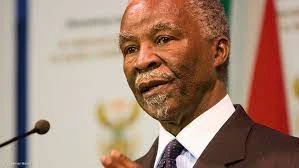In a moment that has reignited the long-standing debate over the controversial slogan “Kill The Boer,” a video of former South African President Thabo Mbeki’s past comments on the chant has resurfaced. This comes after the current leader of the Economic Freedom Fighters (EFF), Julius Malema, sang the slogan during the party’s 10-year anniversary celebration at FNB Stadium on Saturday, July 29.
The slogan “Kill The Boer” has its roots in the anti-apartheid struggle and was reportedly initiated by the late Peter Mokaba, a prominent ANC youth leader known for his fiery rhetoric. Over the years, the song has been classified as a struggle song and has been sung at various political gatherings, including those of the EFF.
In the resurfaced video, former President Thabo Mbeki can be seen discussing the controversial slogan, insisting that it “is not a statement of any kind.” Mbeki’s comments resurfaces during a time when the slogan is already stirring intense emotions and debates within the nation.
The video has sparked fresh controversy, with both supporters and critics of the slogan expressing their opinions on its significance and historical context. Proponents of the song argue that it holds a crucial place in the history of the anti-apartheid struggle, representing the fight against oppression and injustice during a dark period in South Africa’s history.
However, critics contend that the slogan is divisive and inflammatory, as it refers to the Boer community, primarily consisting of Afrikaans-speaking white farmers, and the potential implications of promoting violence. They argue that even if it has historical significance, the use of such a slogan in modern times is inappropriate and risks exacerbating racial tensions.
Julius Malema’s recent rendition of the slogan at the EFF’s 10-year anniversary has added fuel to the ongoing debate. Supporters of Malema argue that his performance was a reflection of the party’s commitment to radical socio-economic transformation and land redistribution, which they believe will benefit all South Africans.
Nevertheless, the use of the controversial slogan has elicited strong reactions from various quarters, with some political leaders and social activists calling for greater responsibility in the use of language, especially in a country still grappling with the aftermath of apartheid.
The resurfaced video of Thabo Mbeki’s comments has prompted public figures and citizens alike to revisit the complexities surrounding the slogan and its place in South Africa’s contemporary political landscape. The debate goes beyond the mere words of the song, touching on the broader issues of reconciliation, unity, and nation-building.
As the controversy continues, the call for constructive dialogue and understanding has become more pronounced, with many urging political leaders to exercise restraint in their language and actions. South Africa’s history is fraught with violence and oppression, and it is essential for current leaders to navigate these sensitivities carefully, mindful of the potential impact their words can have on a still-healing nation.
The debate over the “Kill The Boer” slogan is likely to persist, and it will require a delicate balance of acknowledging its historical significance while fostering an inclusive and united future for all South Africans. The nation looks to its leaders for guidance in charting a path that acknowledges the past but also builds a more harmonious and progressive society. One question that remains, “was former President Thabo Mbeki correct in his assertion that the phrase is not a statement?”
“Kill The Boer”
Was former President Thabo Mbeki correct in his assertion at the TRC, that the phrase is not a statement? pic.twitter.com/Eu1HLJg5g5
— Aldrin Sampear (@AldrinSampear) July 31, 2023






















